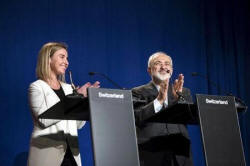|
 Europe
backs Iran nuclear deal in signal to U.S. Congress Europe
backs Iran nuclear deal in signal to U.S. Congress
 Send a link to a friend
Send a link to a friend
[July 20, 2015]
By Robin Emmott and Francesco Guarascio
BRUSSELS (Reuters) - The European Union
approved the Iran nuclear deal with world powers on Monday, a first step
toward lifting Europe's economic sanctions against Tehran that the bloc
hopes will send a signal that the U.S. Congress will follow.
|
|
 In a message mainly aimed at skeptical voices in the U.S. Congress
and strong resistance from Israel, EU foreign ministers meeting in
Brussels stressed that there was no better option available. In a message mainly aimed at skeptical voices in the U.S. Congress
and strong resistance from Israel, EU foreign ministers meeting in
Brussels stressed that there was no better option available.
"It is a balanced deal that means Iran won't get an atomic bomb,"
said French Foreign Minister Laurent Fabius. "It is a major
political deal."
Ministers left the details of their endorsement until after a U.N.
Security Council vote scheduled for 9 a.m. EDT (1300 GMT), but have
formally committed to a gradual lifting of sanctions along with the
United States and the United Nations.
Following the deal in Vienna, Iran has agreed to long-term curbs on
a nuclear program that the West suspected was aimed at creating an
atomic bomb, but which Tehran says is peaceful.
 The European Union will retain its ban on the supply of ballistic
missile technology and sanctions related to human rights, EU
diplomats said.
A senior Western official involved in the accord said a combination
of limitations and verification was enough to ensure Iran would not
obtain a nuclear bomb.
"Our ambition is to embed the Iranian civilian nuclear program into
international cooperation," the official said.
The U.S. Congress received the Iran nuclear agreement on Sunday and
will have 60 days from Monday to decide whether to approve or reject
the deal.
[to top of second column] |

Keen to consider Iran as an alternative supplier of energy at a time
of tensions with Russia, the European Union may reopen an EU
delegation in Tehran and is seeking business opportunities in the
country.
"The Iran deal has a geopolitical impact and also an economic impact
on the European Union," said Austria's Foreign Minister Sebastian
Kurz, who plans to visit Iran in September.
German Vice Chancellor Sigmar Gabriel flew to Iran at the weekend,
becoming the first senior figure from a large Western government to
visit the country since the deal. France's Fabius is also due to
travel there soon.
French automakers had a strong presence in the Iranian car industry
before Iran's isolation over the nuclear issue, and Total <TOTF.PA>
was active in the oil sector.
(Reporting by Robin Emmott and Francesco Guarascio; Editing by Sonya
Hepinstall)
[© 2015 Thomson Reuters. All rights
reserved.]
Copyright 2015 Reuters. All rights reserved. This material may not be published,
broadcast, rewritten or redistributed.
 |